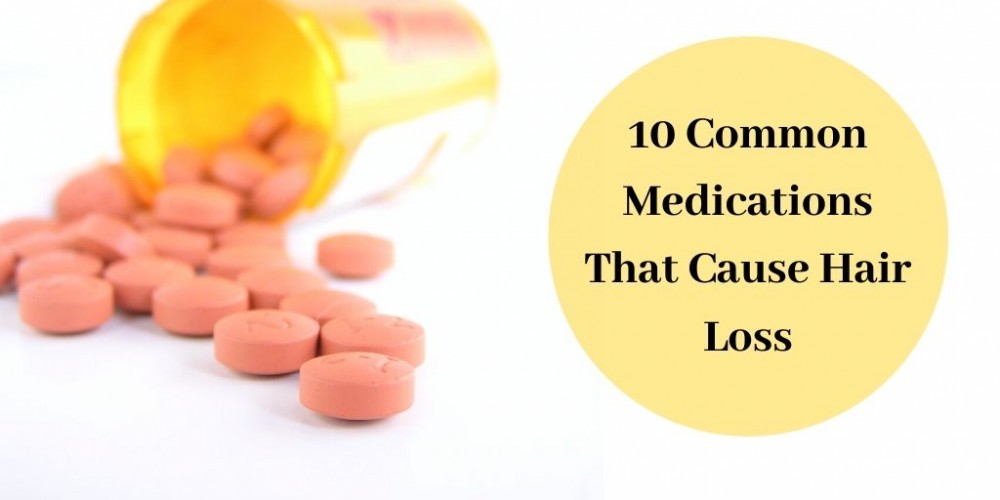Table Of Content

Medication-related hair loss is typically a form of telogen effluvium, which occurs after physical or emotional stress, including illness or major life upheaval. Telogen effluvium pushes hair roots into the resting state prematurely. With this type of hair loss, hair falls out within 2 to 4 months.
Recent Blog Articles
Early treatment of a receding hairline (frontal fibrosing alopecia) might help avoid significant permanent baldness. The cause of this condition is unknown, but it primarily affects older women. In the type of patchy hair loss known as alopecia areata, hair loss occurs suddenly and usually starts with one or more circular bald patches that may overlap. Before pursuing hair loss treatment, talk with your doctor about the cause of your hair loss and treatment options. Most of the time, the hair loss is reversible, with hair resuming growth a few months after stopping or reducing the medication. Valproate/divalproex can cause hair loss, which usually becomes noticeable three to six months after starting the medication.
When to see a doctor
While you can buy a microneedling device without a prescription, it’s best to check with your dermatologist first. Testosterone replacement therapy (TRT) is an effective and safe method for addressing health issues related to testosterone deficiency. A 30-day supply of spironolactone costs $2.19, and oral finasteride costs $4.63 for 30 tablets. A 3-month supply of oral finasteride costs $20 per month, and the same supply of topical minoxidil costs $16 per month. Additionally, males using or taking finasteride should wear a condom during sex.
Prescription Anti-Inflammatory Medication
The Price of Propecia: Side Effects of the Hair Loss Drug - MedShadow Foundation
The Price of Propecia: Side Effects of the Hair Loss Drug.
Posted: Mon, 22 Jan 2024 08:00:00 GMT [source]
Like Propecia, pregnant people should not take or handle Avodart. Tell your healthcare provider you are taking this medication if you ever get screened for prostate cancer, as Avodart can also affect your PSA levels. Explore Mayo Clinic studies testing new treatments, interventions and tests as a means to prevent, detect, treat or manage this condition. Hair loss takes about three months after starting the medication. Hair loss is a reported side effect of oral retinoids, such as isotretinoin. This cause of hair loss can be challenging to identify, given the delay between the trigger and the onset of hair loss.
Best for Age-Related Thinning: Act+Acre Cold Processed Stem Cell Scalp Serum

It typically occurs after age 65 but, for some females, it can begin early in their lives. This man took finasteride to treat his male pattern hair loss, and within 1 year (B), he had noticeable improvement. If you think that you may be experiencing hair loss as a result of a medication, you should speak with a healthcare professional, particularly the doctor that prescribed the suspect medication. Some of the early signs of excessive hair loss include an increased amount of hair on your pillow, more hair on your brush, and more hair in the shower drain. Comparatively, telogen effluvium is the loss of resting or bulb hair, which is more common and can occur due to many different medications.
The cause of the hair loss is similar to methotrexate and occurs in about 10% of users. Methotrexate is the most commonly prescribed disease-modifying antirheumatic drug (DMARD) for rheumatoid arthritis. This works well for people with inherited baldness since they typically lose hair on the top of the head. Because some hair loss can be progressive, you may need multiple procedures over time. Over-the-counter (OTC) medications generally consist of topical creams, gels, solutions, or foams that you apply directly to the scalp.
Once your dermatologist has this information, it’s often possible to tell you what’s causing your hair loss. To get an accurate diagnosis, it helps to see a board-certified dermatologist. These doctors have in-depth knowledge about the many causes of hair loss and experience treating the diverse causes. Below are answers to some of the top questions about hair loss medications.
“Your body’s immune system is attacking the hairs,” Brodell says. “As soon as you notice hair loss is happening, you should come in,” says Lauren Eckert Ploch, a dermatologist in Aiken, South Carolina. Another potential cause of hair loss is anti-seizure medications like trimethadione (brand name Tridione) and valproic acid (brand name Depakote). Most adults hit a point in life when hair loss or thinning is expected. It might not be welcome, but it’s not too shocking that your hair is no longer as lustrous as during your youth. If people are not seeing results from home and natural remedies after a few months, they can discuss other options with their doctor.

You'll soon start receiving the latest Mayo Clinic health information you requested in your inbox. Get instant access to members-only products and hundreds of discounts, a free second membership, and a subscription to AARP the Magazine. Hair loss can be severe and sudden, affecting a lot of hair at once.
Most medications that cause hair loss are initiated or the dose is increased within 3 months of the symptoms. It is important to realize that medication use is not the only possible cause of hair loss and some individuals may experience symptoms for a different reason. Other possible causes include a recent illness or surgery, poor diet, or patterned androgenetic hair loss.
Because this can cause you to get too much of the nutrient, many dermatologists recommend taking a multivitamin instead. You should only take biotin, iron, or zinc when your blood test shows that you have a deficiency. For example, if you take too much iron, you can develop iron poisoning. Within the first few months of treatment, you may notice that you are losing less or minimal amounts of hair.


No comments:
Post a Comment